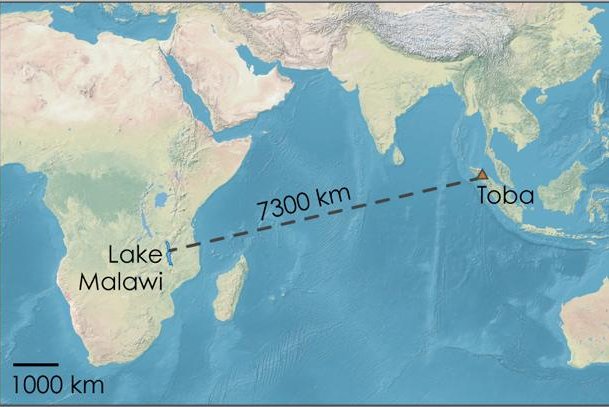When Toba erupted 74,000 years ago, volcanic ash traveled all the way to East Africa. Some of the ash was deposited in Lake Malawi. Photo by AGI/K. Cantner
AUSTIN, Texas, Jan. 15 (UPI) -- Some 74,000 years ago, a supervolcano called Toba on the Indonesian island of Sumatra exploded in what scientists believe was the largest, most violent eruption of the last 2.5 million years.
Previously, researchers believed the Toba catastrophe resulted in a volcanic winter, with clouds of ash blocking out the sun and severely depressing temperatures around the globe.
But new analysis of sediment cores collected from East Africa's Lake Malawi -- where significant amounts of volcanic ash fell -- suggests a mild winter followed the ancient eruption.
Lake Malawi is stratified by temperature. It's also meromictic, meaning it features little to no mixing of its different water layers. However, when weather cools, the lake's temperatures become more homogeneous, encouraging mixing.
If an especially cold volcanic winter had followed Toba's eruption and precipitated greater mixing in Lake Malawi, researchers say they'd see such changes reflected in the types of microfossils preserved in the sediments at the bottom of the lake.
For example, scientists said they would expect to see a higher ratio of surface-dwelling plankton, as water mixed and distributed nutrients more evenly throughout the lake's depths. But sediment cores show no such shift.
Lily Jackson, a geosciences doctoral student at the University of Texas at Austin, told Earth magazine the lack of microfossil anomalies is proof that the Toba eruption failed to have "that dramatic of an effect."
Jackson is the lead author of a new paper on the subject, published in the journal Geology.















